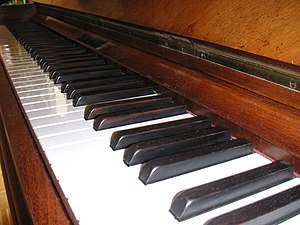 Image via Wikipedia
Image via Wikipedia
If you are finding it a bit difficult to coordinate both hands on the keys, then let me share a few tips and tricks that might help with your piano practice time. The method is quite simple really and it's called slow practice!
1. Slow practice is surprisingly beneficial for good
technique, especially for practicing relaxation. Try
moving one hand separately, slowly at first. Add both
hands together and play through the song slowly.
2. Slow practice reinforces your memory because there is
time for the playing signals to travel from your
fingers to the brain and back several times before
succeeding notes are played. If you practice at the
regular rate of speed, you could be reinforcing hand
memory and losing true memory.
3. Slow practice allows you to practice getting mentally
ahead of the music you are playing, which gives you
control over the piece. This is the time to work on
your chords and chord progressions. Always play at least
a split second ahead of the music and practice feeling
the keys before playing to guarantee 100% accuracy. As a
general rule, think about the next measure of music
ahead. Ask yourself, "Where am I going?", "What's next?"
4. Slow practice is one of the best ways to clean up
bad habits, especially those that you might have
unconsciously picked up during fast practice, like
wrong fingering. Fast practice is mostly reflex hand
memory that bypasses the brain. This is why you are
usually unaware of it.
5. With slow practice you now have time to analyze the
details of the structure of the music as you play, and
pay attention to all the expression markings called
dynamics. Above all, concentrate on making music. Play
the piano for your own pleasure and enjoyment. Your
accuracy on technique is good because you have practiced
slow at first, then pushed you speed later.
6. One of the primary causes of your mind going blank
at a recital or performance is that the brain is racing
much faster than usual and you can "think" many more
thoughts in the same amount of time between notes than
during practice. This extra thinking introduces new
variables that confuse the brain and can disrupt your
rhythm. Practice inserting extra thoughts between notes
during slow practice. What are the preceding and
following notes? Are there any sharps or flats?
Think of typical thoughts you might encounter
during a performance. You can cultivate the ability to
detach yourself from those particular notes you are
playing, and be able to mentally wander around elsewhere
in the music, as you play a given section. Yet you are
still playing slowly, focused with much determination in
your piano playing. Now you can hear the difference.
If you combine all the above objectives, the time spent playing slowly will be truly rewarding. Happy slow practice!
~ LadyD
http://www.LadyDpiano.com
![Reblog this post [with Zemanta]](http://img.zemanta.com/reblog_e.png?x-id=28bb8e35-f346-41c7-9fd5-980248600a03)




No comments:
Post a Comment
So nice to hear from you!